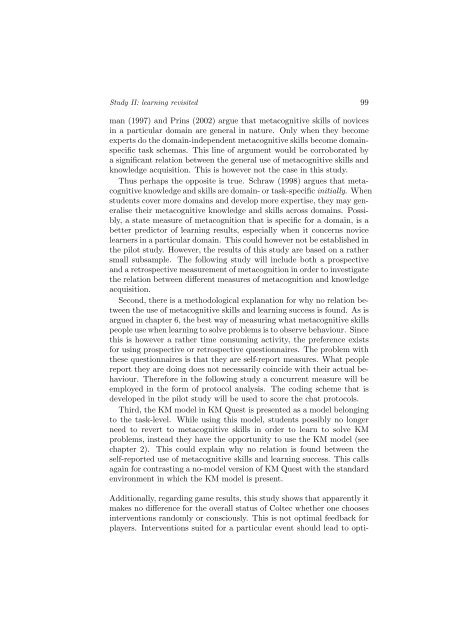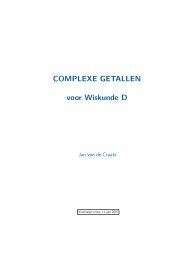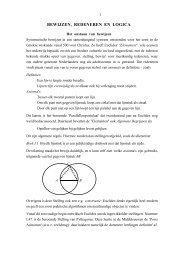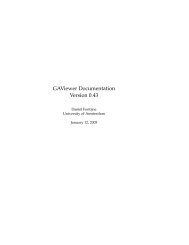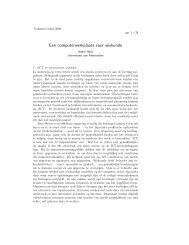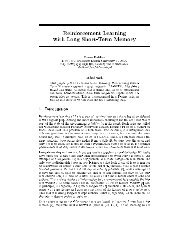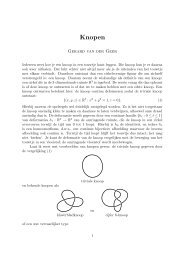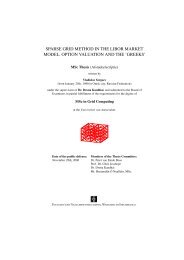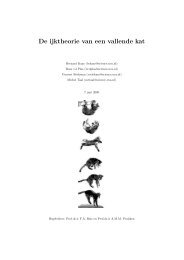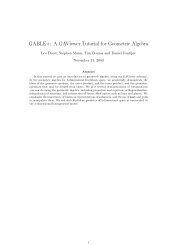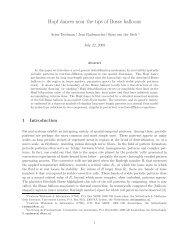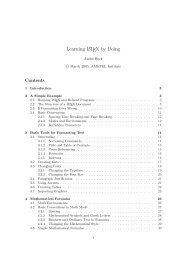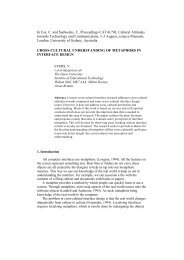The role of metacognitive skills in learning to solve problems
The role of metacognitive skills in learning to solve problems
The role of metacognitive skills in learning to solve problems
You also want an ePaper? Increase the reach of your titles
YUMPU automatically turns print PDFs into web optimized ePapers that Google loves.
Study II: learn<strong>in</strong>g revisited 99<br />
man (1997) and Pr<strong>in</strong>s (2002) argue that <strong>metacognitive</strong> <strong>skills</strong> <strong>of</strong> novices<br />
<strong>in</strong> a particular doma<strong>in</strong> are general <strong>in</strong> nature. Only when they become<br />
experts do the doma<strong>in</strong>-<strong>in</strong>dependent <strong>metacognitive</strong> <strong>skills</strong> become doma<strong>in</strong>specific<br />
task schemas. This l<strong>in</strong>e <strong>of</strong> argument would be corroborated by<br />
a significant relation between the general use <strong>of</strong> <strong>metacognitive</strong> <strong>skills</strong> and<br />
knowledge acquisition. This is however not the case <strong>in</strong> this study.<br />
Thus perhaps the opposite is true. Schraw (1998) argues that <strong>metacognitive</strong><br />
knowledge and <strong>skills</strong> are doma<strong>in</strong>- or task-specific <strong>in</strong>itially. When<br />
students cover more doma<strong>in</strong>s and develop more expertise, they may generalise<br />
their <strong>metacognitive</strong> knowledge and <strong>skills</strong> across doma<strong>in</strong>s. Possibly,<br />
a state measure <strong>of</strong> metacognition that is specific for a doma<strong>in</strong>, is a<br />
better predic<strong>to</strong>r <strong>of</strong> learn<strong>in</strong>g results, especially when it concerns novice<br />
learners <strong>in</strong> a particular doma<strong>in</strong>. This could however not be established <strong>in</strong><br />
the pilot study. However, the results <strong>of</strong> this study are based on a rather<br />
small subsample. <strong>The</strong> follow<strong>in</strong>g study will <strong>in</strong>clude both a prospective<br />
and a retrospective measurement <strong>of</strong> metacognition <strong>in</strong> order <strong>to</strong> <strong>in</strong>vestigate<br />
the relation between different measures <strong>of</strong> metacognition and knowledge<br />
acquisition.<br />
Second, there is a methodological explanation for why no relation between<br />
the use <strong>of</strong> <strong>metacognitive</strong> <strong>skills</strong> and learn<strong>in</strong>g success is found. As is<br />
argued <strong>in</strong> chapter 6, the best way <strong>of</strong> measur<strong>in</strong>g what <strong>metacognitive</strong> <strong>skills</strong><br />
people use when learn<strong>in</strong>g <strong>to</strong> <strong>solve</strong> <strong>problems</strong> is <strong>to</strong> observe behaviour. S<strong>in</strong>ce<br />
this is however a rather time consum<strong>in</strong>g activity, the preference exists<br />
for us<strong>in</strong>g prospective or retrospective questionnaires. <strong>The</strong> problem with<br />
these questionnaires is that they are self-report measures. What people<br />
report they are do<strong>in</strong>g does not necessarily co<strong>in</strong>cide with their actual behaviour.<br />
<strong>The</strong>refore <strong>in</strong> the follow<strong>in</strong>g study a concurrent measure will be<br />
employed <strong>in</strong> the form <strong>of</strong> pro<strong>to</strong>col analysis. <strong>The</strong> cod<strong>in</strong>g scheme that is<br />
developed <strong>in</strong> the pilot study will be used <strong>to</strong> score the chat pro<strong>to</strong>cols.<br />
Third, the KM model <strong>in</strong> KM Quest is presented as a model belong<strong>in</strong>g<br />
<strong>to</strong> the task-level. While us<strong>in</strong>g this model, students possibly no longer<br />
need <strong>to</strong> revert <strong>to</strong> <strong>metacognitive</strong> <strong>skills</strong> <strong>in</strong> order <strong>to</strong> learn <strong>to</strong> <strong>solve</strong> KM<br />
<strong>problems</strong>, <strong>in</strong>stead they have the opportunity <strong>to</strong> use the KM model (see<br />
chapter 2). This could expla<strong>in</strong> why no relation is found between the<br />
self-reported use <strong>of</strong> <strong>metacognitive</strong> <strong>skills</strong> and learn<strong>in</strong>g success. This calls<br />
aga<strong>in</strong> for contrast<strong>in</strong>g a no-model version <strong>of</strong> KM Quest with the standard<br />
environment <strong>in</strong> which the KM model is present.<br />
Additionally, regard<strong>in</strong>g game results, this study shows that apparently it<br />
makes no difference for the overall status <strong>of</strong> Coltec whether one chooses<br />
<strong>in</strong>terventions randomly or consciously. This is not optimal feedback for<br />
players. Interventions suited for a particular event should lead <strong>to</strong> opti-


